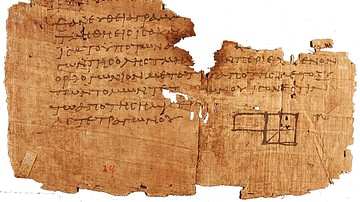
Hippocrates was born on the Greek island of Kos in the 5th century BCE, and he became the most famous physician in antiquity. He established a medical school on the island, wrote many treatises on medical matters, and is, through his systematic and empirical investigation of diseases and remedies, credited with being the founder of modern medicine.
Biographical Details
Information regarding Hippocrates is patchy and unreliable. He was perhaps born c. 460 BCE, but details of his life were speculated upon even in ancient times. One of the oldest sources is the Life of Hippocrates credited to Soranus of Ephesus, himself a physician, who lived in the 1st and 2nd centuries CE. Soranus' method of quoting from now lost earlier texts has been an invaluable source of information on ancient medicine. He states that Hippocrates knew several 5th-century sophists, notably Gorgias of Leontini, and was taught medicine by both his father and Herodicus of Selymbria, a gymnastic trainer. We also know that Hippocrates set up and ran a school of medicine on Kos.
Plato mentions Hippocrates in his Protagoras, suggesting that he worked for fees and believed the body should be treated as a whole (Phaedrus). The Roman scholar and medical writer Cornelius Celsus claims that Hippocrates was the first to separate medicine from philosophy, and other ancient sources also suggest that Hippocrates believed in the importance of diet and exercise for a healthy body. Soranus goes on to inform us that Hippocrates travelled throughout his life and died at Larissa in Thessaly, c. 370 BCE.
In antiquity, many legends arose of Hippocrates' great talents but most of these are likely pure invention. He reportedly discovered that King Perdiccas II of Macedon's health problems were down to lovesickness, he eliminated the plague that hit Athens in 430 BCE by burning fires everywhere, and he treated the philosopher Democritus whom everybody thought mad (not without some justification). Hippocrates had three sons who carried on his work - Thessalus, Dracon, and Polybus.
Hippocratic Corpus
Hippocrates has long been credited with writing a large number of ancient treatises, speeches, and letters on medicine, collectively referred to as the Hippocratic Corpus (Corpus Hippocraticum), which was compiled in the Hellenistic period in Ptolemaic Alexandria. Modern scholars consider that, on stylistic grounds alone, these texts must actually have been written by multiple authors and point out that there is no reference to Hippocrates ever writing anything in sources contemporary with his lifetime. Scholars, therefore, hold the position that some of the texts were written by Hippocrates but exactly which ones are still debated.
The 3rd-century BCE Corpus was edited again in the 1st century CE by the scholars Dioscurides and Capiton. Several ancient writers, often famous physicians themselves, frequently wrote commentaries on works attributed to Hippocrates, amongst the most notable are Herophilus of Chalcedon (4th-3rd century BCE), Apollonius of Citium (1st century BCE), and Galen (2nd-3rd century CE).
The Hippocratic texts deal with all manner of medical topics but can be grouped into the four main categories of diagnosis, biology, treatment and general advice for doctors. There are over 60 treatises, each on specific topics, for example, joints, therapy, regime, surgery, physiology, the progression of diseases, purging remedies, and gynecology. The issues of ethics and medicine's relation to other subjects, especially philosophy, are also discussed.
The Hippocratic Oath
The famous Hippocratic Oath probably appeared after Hippocrates' lifetime and was reserved for a select group of doctors. It was actually a religious document ensuring a doctor operated within and for community values. With the Oath the practitioner swore by Apollo, Hygieia, and Panacea to respect their teacher and not to administer poison, abuse patients in any way, use a knife, or break the confidentiality between patient and doctor. Modern versions of the oath, or similar such statements, are still today sworn by many medical students around the world.
Conclusion
Hippocrates is credited by historians with moving the subject of medicine away from the previously supernatural and religious approach, which had been closely linked to the Greek god of healing Asclepius, towards a modern approach of observation, classification, causes and effects, and so on. Even if others before him, such as Alkmaion of Kroton, had also begun to approach medicine in a rational manner and the details of his life and work are few, Hippocrates has, nevertheless, come to be known, just as he was in the ancient world, as the father of modern medicine.





